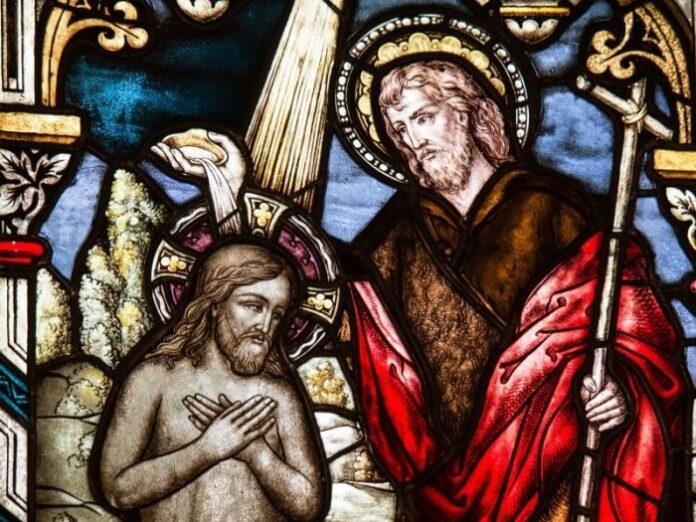Jesus was not baptized because He was guilty of sin, nor because He lacked the grace of the Holy Spirit. The true reason for His baptism is explained to us by John the Baptist and by the Saviour Himself.
Newsroom (11/01/2023 08:30, Gaudium Press) Why did Jesus receive Baptism? We will explain why, and at the same time, what Baptism He received, for these two points are of equal importance. We will begin with the second question, so that you may thus better understand the first.
Jewish ablution (cleansing) erased only bodily stains.
The baptism of the Jews washed away the impurities of the body, but not the sins that were on the conscience: if one committed adultery, theft, or any other crime, this baptism did not erase them; but if one touched the bones of a dead person, ate food forbidden by the Law, came from an unclean place, or had been with lepers, he had to wash and remained unclean until the evening, after which he became pure. “He shall wash his body in pure water and remain unclean only until the evening” (cf. Lev 15:5).
These were not real sins or uncleanness as such, but, the Jews being a rather unrefined and imperfect people, God wished, by the legal observances, to prepare them well in advance for the observation of more important prescriptions.
The Jewish ablution, therefore, did not erase sins, but only bodily blemishes. It is not the same with our baptism, which is far better and full of abundant graces, for it delivers one from sin, purifies the soul, and gives the grace of the Holy Spirit. As for John’s baptism, it was far superior to that of the Jews, but inferior to ours; it was like the hyphen which united them and led from one to the other.
John’s baptism was superior to that of the Jews
John did not direct men to observe bodily purifications; on the contrary, he turned them away from them, to exhort them to pass from vice to virtue, and to place their hopes of salvation in good works, not in the various baptisms and ablutions. He did not say to them: “Wash your clothes and your bodies, and you will be pure”, but rather: “Bear the fruits of true penance” (Mt 3:8).
From this point of view, the baptism performed by John the Baptist was superior to that of the Jews and yet inferior to ours, for it did not give the Holy Spirit, and it did not confer, by grace, the remission of sins. It led to penitence, but did not have the power to forgive sins. For this reason, John said: “I baptize you with water, but he will baptize you in the Holy Spirit and fire” (cf. Mt 3:11). Therefore, John did not baptize in the Holy Spirit. But why in the Holy Spirit and in fire? It was to remind us of that day when tongues of fire were seen resting above the heads of the Apostles (cf. Acts 2:3).
That John’s baptism was imperfect, since it did not confer the grace of the Holy Spirit nor the forgiveness of sins, is inferred from St. Paul’s words to some disciples whom he had met:
“Did ye receive the Holy Ghost, when ye embraced the Faith?” he asked them.
“No, we have not even heard that there is a Holy Spirit!”!” they replied.
“What baptism did you receive?”
“John’s”.
Now, the Precursor gave “the baptism of penance,” but not that of remission. Why, then, did he baptize? He baptized “telling the people that they should believe in Him who was to come after him, that is, in Jesus”. After that, those disciples were baptized in the name of the Lord Jesus. “And when Paul had laid his hands on them, the Holy Spirit descended on them” (cf. Acts 19:2-6).
Do you realize how imperfect John’s baptism was? For if it had not been imperfect, Paul would not have baptized them again, would not have laid hands on them; by doing these two things, he proclaimed the excellence of the Baptism of the Apostles and the inferiority of the other.
Jesus was far superior to John the Baptist himself
We know now what the difference is between the three baptisms of which we have spoken. But why was the Saviour baptized? Which baptism did He receive? This is what remains to be explained.
He received neither the baptism of the Jews nor ours, for He had no need of remission of sins; this, moreover, was impossible, since in Him was no sin, as St. Peter says: “He committed no sin, neither was any falsehood found in His mouth” (I Pet. 2:22). And in St. John we read: “Who among you will accuse Me of sin?” (Jn 8:46). His flesh could not receive the Holy Spirit any more, for it had as its principle the Holy Spirit Himself, who had formed it. Therefore, if this flesh was neither alien to the Holy Spirit nor subject to sin, why baptize it?
Let us begin by explaining which baptism Jesus received, and the rest will be self-evident. Why, then, did this baptism take place? It was not that of the Jews, nor ours, but that of John. Why? For the very nature of this baptism teaches us that the Saviour was not baptized for His sins, nor because He lacked the grace of the Holy Ghost, since this baptism possessed neither one nor the other of these two things, as has been shown above. Whence it is clear that He did not come to John to receive the Holy Spirit nor the remission of his sins. And so that none of those around might imagine that He came to do penance like the rest, see how John prevented this false interpretation. He who cried out to all, “Bear the fruits of true penance” (Mt 3:8), said to the Saviour, “I must be baptized of Thee, and Thou comest to me” (Mt 3:14). He says this to make it clear that Our Lord had not come for the same need as the others, and that, far from being baptized for the same reason, He was far superior to John the Baptist himself, and infinitely purer.
The Holy Spirit wanted to make Him known to all
But then, why did He need to be baptized, if it was not for penance, nor for the forgiveness of sins, nor to receive the fullness of the Holy Spirit?
For two other reasons. One of them was revealed to us by the disciple, and the other was indicated to John by the Saviour Himself. What is the cause of this baptism, given by John? According to what St. Paul says, the people needed to know that “John gave a baptism of penance so that all might believe in Him who was to come after him” (Acts 19:4). This is the purpose of this baptism.
If it had been necessary to go into every house and make people come out to show them the Christ, saying: “This is the Son of God”, such a testimony would have been suspicious and very difficult. If John had entered with Jesus into the synagogue, to show Him, such a testimony would also be suspect. But that Jesus Himself came to be baptized before the people of all the towns adjoining the Jordan, that He was commended by the voice of His Father descending from Heaven, and that the Holy Spirit rested upon Him in the form of a dove: here is something that does not allow us to doubt John’s testimony. For no other reason, the holy Precursor adds: “I myself did not know him” (Jn 1:31), thus demonstrating that his testimony is worthy of faith.
Jesus and John were related in the flesh: “Elizabeth also, your kinswoman, has conceived a son” (Lk 1:36), said the Angel to Mary, speaking of John’s mother. So that this kinship might not appear to be the cause of John’s witness to Christ, the grace of the Holy Spirit arranged things in such a way that John spent his early youth in the desert, and thus his witness did not appear to be dictated by friendship and with a premeditated design, but was inspired by a warning from on high. This is the reason why he says (cf. Jn 1:32-33):
“I myself did not know Him.”
“Where, then, did you know him?”
“He who sent me to baptize in water said to me.”
“What did he say?”
“On whom you see the Holy Spirit descend like a dove and rest, this is He who baptizes in the Holy Spirit.”
As you see, the sacred text speaks of the Holy Spirit, not as coming down for the first time upon Jesus Christ, but as showing Him, pointing to Him with His finger, as it were, and making Him known to all. This is the reason why He came to have Himself baptized.
To obey the Prophets was justice
There is another reason, indicated by Him. What is it? When John said to Him, “I must be baptized of Thee, and Thou art coming to me,” Jesus replied, “Permit it to be so now, for thus it is fitting for us to fulfil all righteousness” (Mt 3:14-15). Have you noticed the servant’s modesty? Have you noticed the humility of the Master? What does “fulfilling all righteousness” mean? Justice is understood as the observance of all God’s commandments, according to this passage: “They were both righteous in the sight of God, and observed all the commandments and precepts of the Lord faultlessly” (Lk 1:6). All men ought to fulfil this righteousness, but none was faithful, none fulfilled it; therefore Christ came and fulfilled it.
You may ask, what justice is there in His being baptized? To obey the prophets was righteousness. Just as Jesus was circumcised, offered the sacrifice, observed the Sabbath and celebrated the Jewish feasts, so He added here what remained to be fulfilled by submitting Himself to the Prophet who baptized.
Such was the will of God that all should receive baptism, that John tells us: “He who sent me baptized with water” (Jn 1:33), and Christ himself expresses it thus: “The people and the publicans heeded the will of God in receiving baptism from John; but the Pharisees and the scribes refused baptism and despised the counsel of God concerning them” (Lk 7:29-30).
If, then, it is justice to obey God, and if God sent John to baptize the people, Jesus fulfilled this point of the Law with all the others.
The New Divine Ark has returned to Heaven
If you like, compare the Commandments of the Law to two hundred denarii: the human race needed to pay off this debt of sin. We had not paid it, and death had a hold on us under the weight of these transgressions. The Saviour, having come and found us bound, paid off our debt and redeemed those who could not afford to pay. For this reason He does not say: “We must do this or that”, but “we must fulfil all righteousness”. It is as if He were saying: “It is fitting that I, the Master, should pay for those who have nothing”.
Such is the occasion of His Baptism, the need to manifest the fulfilment of all justice, and to this cause must be added that given above. This is why the Holy Spirit descended in the form of the dove, which is the symbol of reconciliation with God. Thus it was that at the time of Noah’s Ark, the dove, carrying in its beak an olive branch, came to announce the divine mercy and the end of the flood. Even now, it is in the form of a dove – note that I say form, not body – that the Spirit of God comes to announce pardon to the world, and at the same time to communicate that the spiritual man must be innocent and simple, and turn away from evil, according to these words of Christ: “Except ye be converted, and become as little children, ye shall not enter into the kingdom of heaven” (Mt 18:3).
The first ark remained on earth, but the New Divine Ark, Our Lord Jesus Christ, returned to Heaven when the divine wrath was appeased, and now His innocent and pure Body is at the right hand of the Father.
By St. John Chrysostom – Homily on the Baptism of Our Lord and the Epiphany.ium Press.
Compiled by Sandra Chisholm


































